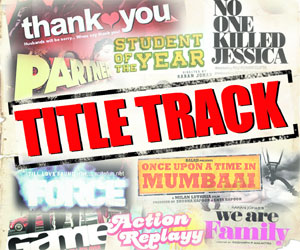TITLE TRACK
As words like ishq and sanam get outdated,Bollywood looks at English titles to connect with the audience.

As words like ishq and sanam get outdated,Bollywood looks at English titles to connect with the audience.
When Milan Luthria suggested Once Upon A Time In Mumbaai as the title for his film,producer Ekta Kapoor was apprehensive. An English title for a Hindi film of mass appeal was too big a risk to take,she thought,as it might alienate the Hindi-speaking audience. Kapoor instead suggested Mumbai Raat Ki Baahon Mein. At one point she even considered having two different titles one in English for the A-tier cities and another one in Hindi for smaller towns. Eventually,the team followed its instinct and retained the name that had originally been given by the films writer,Rajat Arora.
In director Vikram Bhatts opinion,Hindi titles fail to strike a chord with todays audience. You can no more call your film Hum Dil De Chuke Sanam or Hum Aapke Hain Kaun? these titles worked best in the past with the prevailing cinematic sensibilities. But no one uses words such as sanam these days. Now,people want a cool and aspirational touch or at least to use the words they get to hear often, he reasons.
Filmmaker Nishikant Kamat seconds Bhatt. The key character in his upcoming film Force played by John Abraham is driven by passion for his job as a cop as well as his beloved. Kamats first option was to call the film Junoon. But the fact that Bollywood has already seen two films by the same name made him change his mind. The title works for the film on multiple levels,especially since rural India refers to the police force as force, he explains.
Many may argue that recently,Hindi titles such as Ishqiya and Dabangg,have seen a larger connect with the Hindi hinterland,with the latter now having entered the common mans lingo. Bhatt suggests that the novelty factor of these words,since they were relatively unused,played a huge role in the films popularity. Apart from that,any title is perfect if it conveys the essence of the film and forms a connect with the audience, Bhatt points out.
First-time filmmaker Abhinay Deo says that a connect with the masses is important if a film wants to tap the single-screen audience too. His forthcoming thriller,Game,was earlier titled Crooked but the name was changed keeping the audience in mind. If English is your choice for title,the trick lies in using words that are oft-used. Terms like partner,rockstar,ready,thank you or no entry cut across sections. In contrast,an intellectualised name such as No One Killed Jessica had to depend on awareness about the Jessica Lall murder case in order to establish a link.
It was,in fact,the intrigue factor that compelled Luthria to call his next The Dirty Picture. It probably does alienate the Hindi-speaking audience but one cannot please everybody. The Dirty Picture is a title that retains the essence of the film but has so many connotations that it draws people to it as well. And at the end of the day,isnt that what matters?